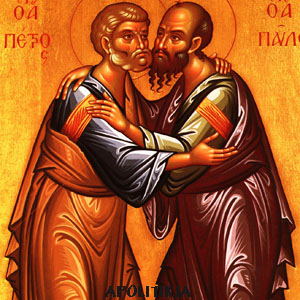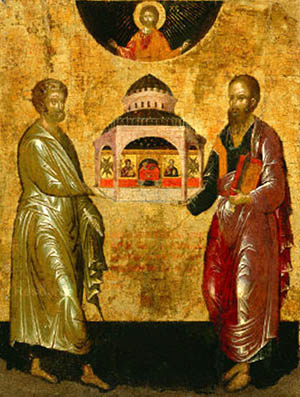The Renewal of the Universe
"Creation shall be delivered from the bondage of corruption"(Romans 8:21).
"But we, the pious, cry unto Thee, O Comforter, in a God-inspired manner: 'Blessed art Thou, O Renewer of the universe."'1
The Great Feast of Pentecost, provides us with the opportunity to delve further into what is also a great Mystery of the last times: the renewal of the universe.
The Church was engendered on earth by the Holy Spirit for the purpose oftransforming the earth into a Church - to Baptize the earth in the waters of the Incarnation of the Word and in the fiery flames of Pentecost.
The renewal of the universe began with the Incarnation and Pentecost; the Church of the Divine Comforter "is the innermost ontological mystery, the fiery seed hidden in the depths of the world - the seed of its eschatological transfiguration."
Just as man, the king of creation, fell into corruption on account of his disobedience, so in the same manner was creation "made subject to vanity" and to the "bondage of corruption," "not willingly, but by reason of Him Who hath subjected it."2
At the end of the world, something analogous will happen: "Not only will people be resurrected incorrupt by the power of the Holy Spirit, but also the whole world," namely, all of sensible Creation (the heavens, luminaries, stars, and the elements); and "it is destined to come again to its ancient state of incorruptibility which it had before Adam fell through his disobedience."3
It is a common teaching of the Holy Prophets, Apostles, and Fathers of our Church that the perpetual creative activity of the Holy Spirit, which continuously renews the earth and creation, will definitively free it in the last times "from the bondage of corruption into the freedom of the glory of the children of God."4
"For there shall be a new heaven and a new earth"; "we look for new heavens and a new earth, according to His promise [in accordance with the Lord's promise], wherein dwelleth righteousness [holiness]"; "and I saw a new heaven and a new earth: for the first heaven and the first earth were passed away."5
Our Holy and God-bearing Father Symeon the New Theologian describes in a wondrous manner in his special discourse, "How Creation Will Be Renewed and New Heavens and a New Earth Will Be Made, According to the Divine Apostle," and "What Will Be the Final Radiance of Creation."7
The Saints particularly emphasize that the renewal and the rendering incorruptible of creation depend directly on man:
"First people will be renewed and will be rendered incorrupt through the Resurrection, and then all of the elements and creation. As indeed man first fell into corruption, and then creation, through man, so must man again first be rendered incorrupt and then, through man, creation be rendered incorrupt."8
Then, at the end of the world, the renewal of the universe will constitute an expression of the love of the heavenly Father for His children:
"Just as a father, at the time of the glory and joy of his sons, adorns even his servants for the greater glory of his sons, in the same manner does God, at the time of the glory, joy, and incorruptibility of us, His sons, adorn also this enslaved world with the beauty of incorruptibility for our greater glory."9
After this wondrous renewal and the just judgment, our much-desired and sweetest Master Jesus Christ will bestow on the Righteous-in accordance with the worthiness and radiance of each one's works-the appropriate abode in the one Kingdom of Heaven for all.
There, in the Glory of the Kingdom, everyone will see Christ, "Who will be present with each one, and each one will be with Him; and He will be shining in each one, and each one will be shining in Him; and woe to those who will then be found outside of His House."10
O Divine Comforter, renewer of our sinful nature and of the world, "come and dwell in us" permanently, free us from the bondage of corruption, cleanse us in the flames of the Pentecost of the Mysteries of the Church, and vouchsafe us the eschatological radiance!
"But we, the pious, cry unto Thee in a God-inspired manner: Blessed art Thou, O Renewer of the universe!"1
Notes
1. Iambic Canon of Pentecost, Seventh Ode, Troparion 1.
2. Romans 8:20, 21.
3. St. Nicodemos the Hagiorite, Nea Klimax [The New Ladder], pp. 55, 56.
4. Romans 8:21.
5. Isaiah 65:17; cf. Isaiah 66:22; II St. Peter 3:13; Revelation 21:1.
6. Ethical Discourse I, §§4, 5.
7. St. Nicodemos the Hagiorite, on II St. Peter 3:10. Cf. St. John Chrysostomos, Homily 14 on the Epistle to the Romans, §5, Patrologia Græca, Vol. LX, col. 530.
8. St. Nicodemos the Hagiorite, on II St. Peter 3:13.
9. See note 6.
10. See note 1.





